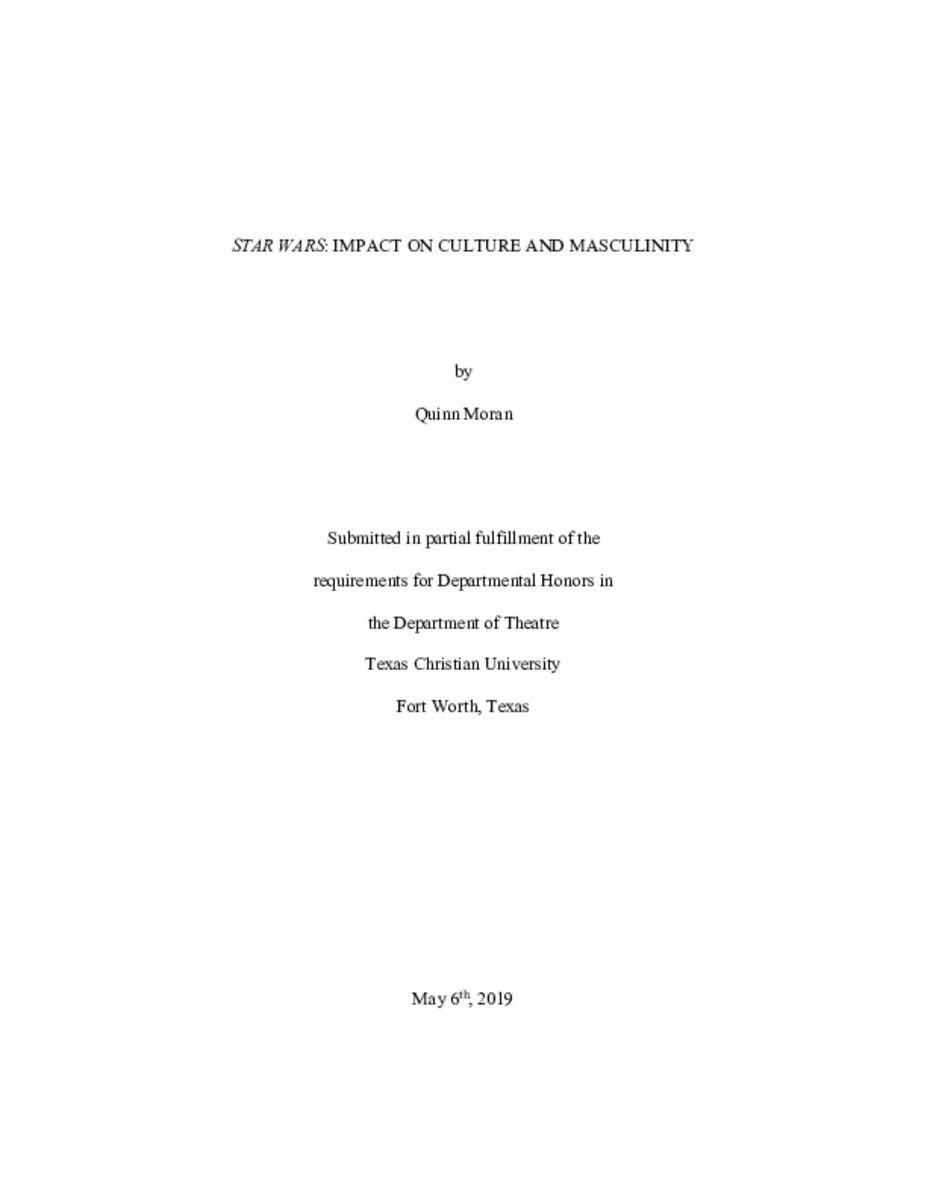Star Wars: Impact on Culture and MasculinityShow full item record
| Title | Star Wars: Impact on Culture and Masculinity |
|---|---|
| Author | Moran, Quinn |
| Date | 2019 |
| Abstract | In America today, there is a problem. For a long time, this problem has been viewed as natural and unchangeable, and has been accepted as the norm in society. Because this norm is so ingrained into American culture, those who stand up against it often face social scrutiny and isolation. This social epidemic affects the well-being of every single member of society and it needs to be changed. This problem is the harmful way that men are socialized in America. For many years, men in America have not felt able to openly express feelings of fear, sadness, or loneliness without judgement or banishment from their social groups. These emotions are encouraged to be suppressed while stoicism, anger, and physical dominance tend to be used instead as a route to validation and feelings of power. This societal expectation has been woven into the paradigms of all Americans and has set a shallow foundation for men to build their identities from. Using physical strength and emotional invulnerability is the dominant masculinity in America, "the most powerful celebrated, common or current form of masculinity in a given context" (Filteau). I would argue that this type of behavior has formed as a compensation for feelings of powerlessness or a general sense of not being in control. This lack of autonomy, a sense of control in one's life, is one of the main reasons men turn to "hyper-masculine" behaviors, to try and reclaim a sense of control. Now some may say, "wait a minute, men have always been in control. We live in a patriarchal society; how could men not feel powerful?" While men have traditionally held power in the large scale (via a patriarchal society), on the individual level many men do not feel powerful. "when you say...men must feel powerful, they look at you cross-eyed. They say, "What are you talking about? I have no power. My wife bosses me around. My kids boss me around. My boss bosses me around...with men you have an asymmetry. All of the power in the world has not trickled down to individual men feeling powerful" (Kimmel 4, 5). Men are searching for a way to feel in charge of their own lives, and one of the ways they learn how to claim that feeling of control is through the presentation of masculinity in the media. In this paper, I am going to attempt to show how the depiction of masculinity in the Star Wars films in some ways perpetuates the dominant American masculinity. In the Star Wars saga, male heroes attempt to defeat their foes with the use of physical force, while at the same time being advised by their mentors to bury their emotions. In this essay I will reveal the ways in which American males are socialized to form the harmful dominant masculinity prominent today. I will then relate this framework to the socialization of the Jedi in Star Wars. More specifically, I will focus on Anakin Skywalker, and show how Anakin's toxic upbringing in the Jedi Order led him to become Darth Vader. Next, I will more broadly examine how the movies use violence to resolve conflict, and how some fights use dramatic elements more effectively than others to justify the need to fight, which in turn can positively or negatively impact viewers' concepts of masculine behavior. |
| Link | https://repository.tcu.edu/handle/116099117/27065 |
| Department | Theatre |
| Advisor | Shorter, Alan |
| Additional Date(s) | 2019-05-19 |
Files in this item
This item appears in the following Collection(s)
- Undergraduate Honors Papers [1362]
© TCU Library 2015 | Contact Special Collections |
HTML Sitemap



